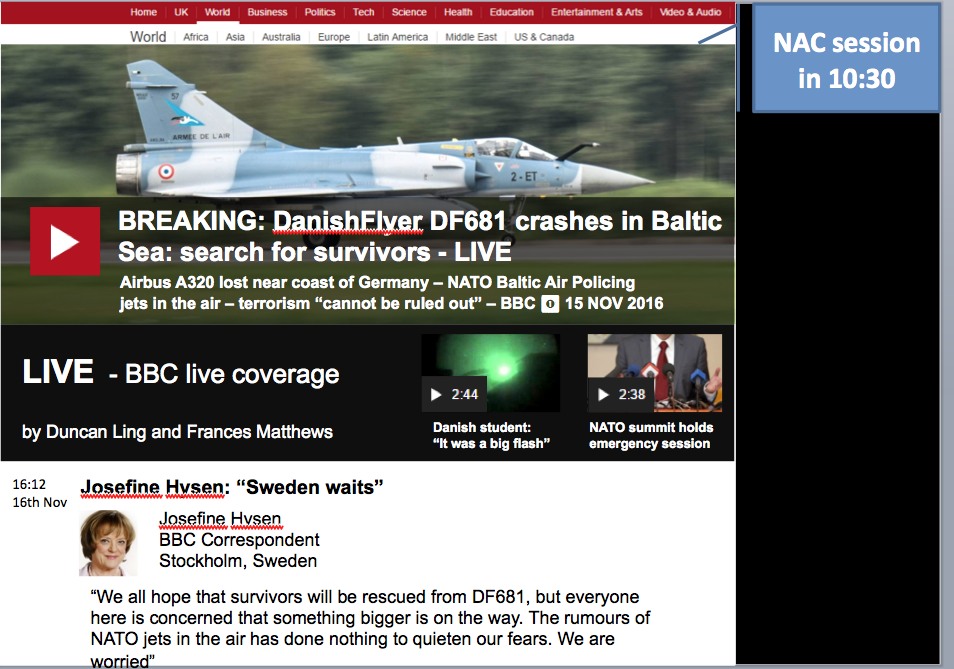
In this post I wanted to write in a pretty unguarded way about how simulating a crisis for NATO has supported my teaching of an international relations unit called International Organization.
International Organization is a tough course to teach. The biggest challenge is always posing organizations in the form of conceptual problems, rather than just going through their anatomy. This is engaged pedagogical practice, but it is also pragmatic: if I taught students how the UN Security Council worked today, and it was reformed tomorrow, they could be forgiven for thinking my course was a waste of a Tuesday afternoon! So I try to keep out of the rote memorization of how organizations are put together, and ask questions about how and why they came about, and where they're going.
One of the problems I wanted to pose for students was the actual day-to-day practice of being in an international organization and using that kind of venue to cooperate and compete with fellow actors. Led by my research and experience of role-playing a fictional organization last year, I decided to put together a simulation in order to guide students through something like the experience of being a delegate to an international organization. This year, we simulated NATO, employing an accurate model for debate and discussion, a committee structure for deliberating and drafting policy as well as a senior council for the final agreement, and a crisis session.
The students were divided into teams, each team to a real-life member state of NATO like the USA, Albania, Croatia or Germany. In the crisis session, the whole cohort of 120 or so students came together and were given a live, breaking simulation of a crisis, based closely on real life events, in which a Russian military aircraft collided with an airliner over the Baltic Sea. The crisis was accompanied by mock-up news articles, NATO and military briefing papers as accurate as I could make them, realistic call-signs for the interceptors, and carefully planned stimuli to elicit a critical perspective from students about military buildup and the tide of war through securitization and competitive rhetoric.
I was extremely happy with how difficult the students found it to come to any agreement. NATO decides by consensus, and member states were so eager to have a say, push their own standpoint and get their preferred policies passed that the group was unable to agree on much more than a basic statement on the event. I was clear to students that this was a great educational experience since almost all were both excited by the event and eager to continue, but frustrated by the process. Politics is often reported to us in public discourse as the meeting of diplomats or other elites who decide or agree on certain things, and the students were able to simulate the experience of being elites, but they were also able to access the vital role of stalemate and disagreement. Often, organizations and meetings, even the most senior ones, are unable to agree on anything without lots of informal networking, deliberation, horse trading and diplomacy.
There are a few opportunities to develop after the crisis session. First, I am pushing students in the final meeting of their simulation - the North Atlantic Council - to learn from their experience in the crisis session, and make greater use of informal discussion and caucusing, opportunities to convince others through rhetoric, and so on. This will build an extra layer of learning through practice. Second, I am thinking through ways to adapt the simulation approach to a more varied body of student-led actors. Students in the unit have flourished in their representation of member states, and their enthusiasm and engagement with the idea of being diplomats from a national government has been inspiring. However, the singular focus on state-to-state relations has restricted their opportunities to talk outside the boundaries of state conflict and military deployments. There has been a minor tendency towards Ruritanian thinking, and a lot of discussion of foreign policy towards Russia that has been useful but rather to the exclusion of other important issues. I am eager to include a broader selection of actors to join states, such as regional organizations and NGOs. I have a few ideas for this and look forward to the opportunity to try them out.
Respond